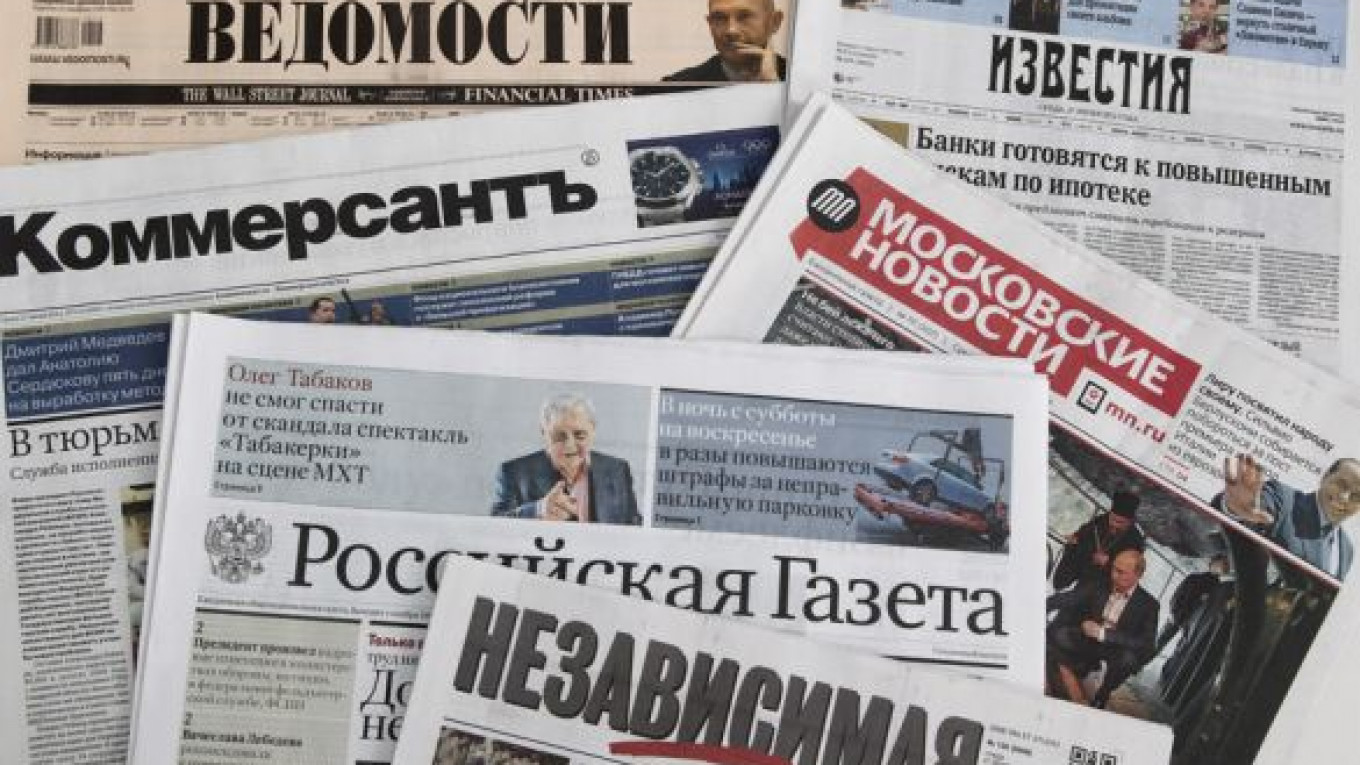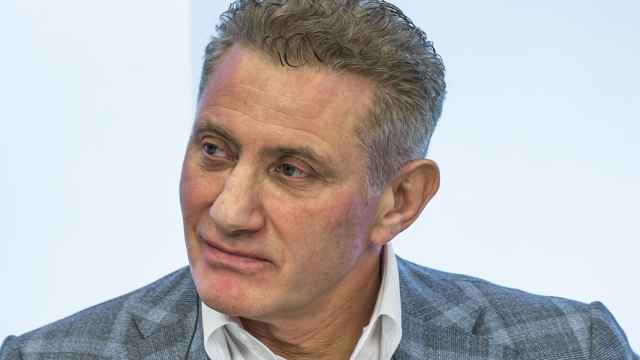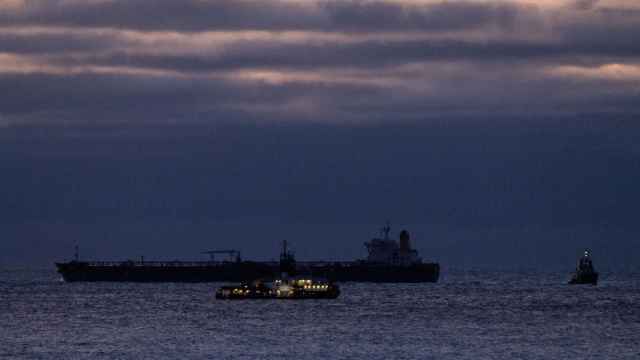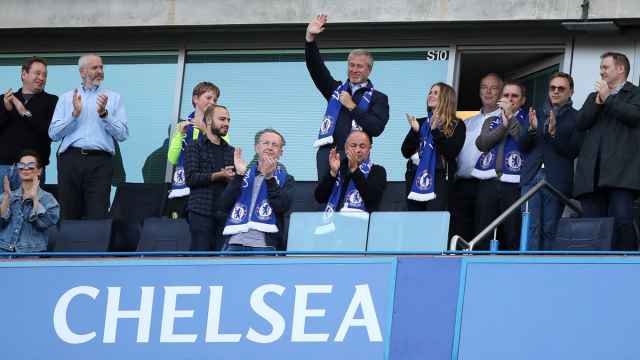Kommersant
1. Maxim Ivanov interview with the head of Crimea's Constitutional Commission Grigory Yoffe, headlined "'Discussion of constitution by people is Soviet-time act'", who speaks about the pending constitution of the peninsula that may be adopted before April 10; pp 1, 3 (1,186 words).
2. Yelena Kovaleva et al. article headlined "Cash register of transit period" describes the new payment and banking systems to start operating in Crimea and Sevastopol after the regions joined Russia. The Russian government will meet today in Crimea to discuss the issue; pp 1, 10 (664 words).
3. Alexei Shapovalov article headlined "They are united in consumption" says that Russians have begun spending their savings given the weakening ruble rate and a price hike; pp 1, 6 (754 words).
4. Vladislav Novy and Roman Rozhkov article headlined "Gazprombank engages in shopping" says that Gazprombank has bought a 21.1 percent stake in Runet's oldest online shop Dostavka.ru; pp 1, 12 (528 words).
5. Natalya Gorodetskaya et al. article headlined "Constituent part of unusual form" says that according to the pending constitution of Crimea, the peninsula will be a parliamentary republic. Its head will be elected by the parliament upon the recommendation of the Russian president, but at the same time the parliament will have broader powers, particularly concerning staff policy; pp 1, 3 (1,016 words).
6. Ivan Safronov article headlined "Place being looked for for Russian arms in Latin America" says that state arms export agency Rosoboronexport has discussed Russian arms supplies to the Latin American market at the international military exhibition FIDAE 2014 in Chile. As soon as in summer, Russia may sign contracts to supply Pantsir-S1 air defense systems to Brazil, the article says; p 2 (570 words).
7. Irina Nagornykh article headlined "United Russia refreshes ideology" says that the ruling United Russia party is holding a series of lectures for State Duma deputies and party activists. Last week, the deputy chief of the presidential administration for public projects, Olga Vasilyeva, delivered a lecture on conservatism in Russia; p 2 (557 words).
8. Ivan Tyazhlov article headlined "Country of serving" says that the number of Ukrainians, who have asked for asylum in Russia, has doubled; p 5 (467 words).
9. Tatyana Grishina and Vadim Visloguzov article headlined "State auditor calculates post to himself" says that former auditor of the Audit Chamber Igor Vasilyev has become the head of the Federal Agency for Land Surveying and Cartography ; p 6 (578 words).
10. Yelena Chernenko article headlined "Ukrainian crisis lands in Paris" says that Foreign Minister Sergei Lavrov and U.S. Secretary of State John Kerry held an unplanned meeting in Paris to discuss the Ukrainian crisis. There is a chance that a joint Russia-U.S. plan to settle the crisis may be developed following this meeting, the article says; p 7 (537 words).
11. Yelena Chernenko interview with the head of the EU Ambassador to Russia, Vygaudas Usackas, headlined "'Hope we have reached the bottom'", who denies that EU sanctions against Russia will affect ordinary Russians and expresses hope that the EU-Russia conflict over Ukraine will be settled; p 7 (425 words).
12. Nina Sokolova article headlined "Mass political nomination" looks at candidates running for the Ukrainian presidency to be elected May 25. Russian experts believe that the main political struggle will be between opposition leader Yulia Tymoshenko and billionaire Petro Poroshenko, who is believed to have sponsored the Euromaidan protest; p 7 (562 words).
13. Yury Barsukov article headlined "Ukraine to preserve unrecognized discount" says that Russia has begun to withdraw from the Russian-Ukrainian agreement on the deployment of the Black Sea Fleet in Sevastopol, signed in Kharkiv in 2010, under which Kiev got a discount on Russian gas supplies. Kiev is not going to acknowledge the cancelation of the discount, which will most probably further increase Ukraine's gas debt; p 11 (574 words).
14. Olga Mordyushenko and Yury Barsukov article headlined "Independent front stands in front of Gazprom" says that the independent gas manufacturer Novatek wants Russian gas giant Gazprom to buy its gas for export at global prices proportionally to the share on the domestic market. This will enable Novatek to double the price of its gas; p 11 (550 words).
Nezavisimaya Gazeta
1. Vladimir Mukhin article headlined "Ukraine hits Russia's nuclear sore spot" says that Ukraine has stopped military and technical cooperation with Russia in response to the latter's withdrawal from the Russian-Ukrainian agreement on the deployment of the Black Sea Fleet in Sevastopol, signed in Kharkiv in 2010. Moscow does not regard the move as a tragedy, but experts say that the Russian army's combat capacity will suffer from it; pp 1-2 (652 words).
2. Darya Tsilyurik article headlined "Lavrov and Kerry compare approaches" says that Russia and the U.S. are close to reaching a compromise on the settlement of the Ukrainian crisis; pp 1-2 (768 words).
3. Yekaterina Trifonova article headlined "NGO to be protected from West's pernicious influence" says that the Federation Council is considering amendments to the law on non-commercial organizations (NGOs), authorizing the Justice Ministry to determine whether or not an NGO financed from abroad is a "foreign agent"; pp 1, 3 (643 words).
4. Alexandra Samarina article headlined "National territorial bargaining" says that the Crimean Tatar Mejlis has announced the cancelation of a referendum on joining Russia and decided to try to obtain the status of a national autonomous region ; pp 1, 3 (958 words).
5. Tatyana Ivzhenko article headlined "Between Tymoshenko and Poroshenko" says that the nomination of candidates for the May 25 presidential election has ended in Ukraine and looks at presidential candidates; pp 1, 6 (1,406 words).
6. Editorial headlined "Obama's refusal" comments on U.S. President Barack Obama's statement that NATO will not expand through Ukraine and Georgia. Kiev is not much affected by this. For Tbilisi, this means the failure of its foreign policy launched in 2003. For Moscow, this is advantageous as the statement has encouraged pro-Russian forces in Georgia, who have recently stepped up their activities; p 2 (531 words).
7. Yevgeny Grigoryev article headlined "Three former German chancellors against policy of sanctions" says that the German government has split over anti-Russia sanctions. Meanwhile, three former German Chancellors- Helmut Schmidt, Gerhard Schroeder and Helmut Kohl-have publicly opposed anti-Russia sanctions and backed the Russian authorities' actions in Crimea; p 2 (567 words).
8. Boris Kagarlitsky article published in the regular Carte Blanche column headlined "Free and independent Russia" looks at the advantage of anti-Russia sanctions introduced by the EU and the U.S. for the Russian economy; p 3 (602 words).
9. Anastasia Bashkatova article headlined "Russia outstrips U.S. in defense spending share" says that according to experts from the Gaidar Institute, Russia's defense spending has recently sharply increased and its federal budget has become more classified; p 4 (854 words).
10. Alina Terekhova report "Small business to pay twice" says that the Russian government has invented new taxes for businessmen; pp 1, 4 (700 words).
11. Yury Paniyev report "U.S., EU rack their brains over anti-Russia sanctions" says that the West's trust in Moscow has been undermined, but it is not another Cold War; pp 9-10 (1,200 words).
12. Sergei Yermakov report "NATO captured by expansion" looks at NATO and its ability to strengthen European security; pp 9-10 (1,500 words).
13. Sergei Zhiltsov report "Political rupture of Ukraine" looks at the situation in Ukraine and says that the presidential election will increase inter-regional contradictions in the country; p 11 (1,200 words).
Vedomosti
1. Editorial headlined "Global mobilization" says that the Russian authorities' policy towards Ukraine has had an economic and political effect on global developments; pp 1, 6 (500 words).
2. Polina Khimshiashvili et al. article headlined "Call for Dniester region" says that President Vladimir Putin has had a telephone conversation with U.S. President Barack Obama, in the course of which the Dniester region issue was discussed along with the Ukrainian crisis. Russia may recognize the region's independence to prevent negative geopolitical implications of Moldova's integration with the EU or to solve Russia's strategic tasks in Eastern Europe in response to the U.S. missile defense activity there, the article says; p 2 (700 words).
3. Anastasia Kornya article headlined "Second 'Bolotnaya case'" says that Moscow's Zamoskvoretsky court has begun to hear the second "Bolotnaya case" on the May 6 2012 riots on Moscow's Bolotnaya Square, whose defendants are charged with having participated in riots and resisted policemen; p 2 (500 words).
4. Polina Khimshiashvili and Alexei Nikolsky article headlined "Ukrainian federation" says that according to Foreign Minister Sergei Lavrov, Russia is insisting on the federalization of Ukraine as a way out of the Ukrainian crisis. Former Ukrainian President Viktor Yanukovych, whom Russia sees as the legitimate president, as well as residents of the country's southeast are backing Russia's stance; p 3 (550 words).
5. Alexei Nikolsky article headlined "Russia gives unnecessary things" says that the transfer of the weapons of the Ukrainian military units in Crimea, that have not sided with Russia, to Ukraine, has been completed; p 3 ().
6. Svetlana Bocharova article headlined "Autonomous Tatars" says that the Crimean Tatar Mejlis has decided to form a national autonomous region; p 3 (600 words).
7. Margarita Papchenkova article headlined "Punishment for banks" says that Russia is ready to join the U.S. Foreign Account Tax Compliance Act (FATCA). However, the U.S. may refuse to sign a corresponding agreement in response to Crimea's joining Russia; p 5 (800 words).
8. Editorial headlined "Crisis of democracy" says that democracy as a form of government is facing a crisis now; p 6 (400 words).
9. Leonid Gozman and Roman Bessmertnyy article headlined "Switch to game with non-zero sum" suggests establishing an international group of civil experts as the most advantageous way for all sides to settle the Ukrainian crisis; p 7 (800 words).
10. Maria Zheleznova article headlined "Person of week: Andrei Klishas" comments on Federation Council member Andrei Klishas' initiative to oblige Russians, who have foreign citizenship, to inform the authorities about this under threat of prosecution; p 7 (350 words).
11. Tatyana Voronova report "Ukrainians conclude private deal" says that the bank Moskomprivatbank, an affiliate of Privatbank, may be sold to Troyka-D bank this week; pp 1, 14 (650 words).
12. Irina Mokrousova report "Timchenko chooses Russia" says that Gennady Timchenko, former co-owner of Gunvor, is investing money in Russia from the sale of his share in the trading company; pp 1, 13 (700 words).
Izvestia
1. Tatyana Shirmanova and Pavel Chernyshov article headlined "Government to cancel quotas on migrant workers" says that the governmental commission for migration policy has backed the cancelation of quotas for migrant workers; pp 1, 3 (1,065 words).
2. Alexander Yunashev and Yegor Sozayev-Guryev article headlined "Banderites threaten Russians" says that a public opinion poll conducted by VTsIOM has shown that 28 percent of Russians dislike Ukrainian ultra-nationalists Banderites,, 33 percent of respondents feel antipathy towards them and 38 percent of those polled condemn them; pp 1, 4 (547 words).
3. Sergei Podosenov article headlined "President improves image of government and United Russia" says that according to a public opinion poll conducted by the independent pollster Levada Center, Putin's approval rating has reached record high of 80 percent. Also, the approval ratings of Prime Minister Dmitry Medvedev, the government, the State Duma and the ruling United Russia party have increased; pp 1-2 (588 words).
4. Anastasia Kashevarova and Yelena Teslova article headlined "Trend to appoint businessmen as governors may be given up" says that a report on the ineffective performance of governors representing the business community prepared by the All-Russia People's Front may put an end to the practice of appointing businessmen as regional heads; p 2 (1,301 words).
5. Natalya Bashlykova article headlined "Opposition's consolidation does not deprive Znatkov of leadership" says that opposition candidates running for the post of Mayor of Novosibirsk have withdrawn from the election for the benefit of Communist nominee, State Duma lawmaker Anatoly Lokot, after the regional court reinstated United Russia candidate Vladimir Znatkov in the election; p 2 (827 words).
6. Yelizaveta Mayetnaya article headlined "Life and death of Sashko Bily" looks at one of Right Sector's leaders Oleksandr Muzychko aka Sashko Bily and tries to explain why he has become a national hero in western Ukraine; p 5 (2,581 words).
7. Vladimir Zykov article headlined "Wikipedia fights for domains" says that the U.S. Wikimedia Foundation, the owner of the free online encyclopedia Wikipedia, will register the trademark "Wikipedia" in Russia. This will make it possible to gain control over the domains wikipedia.ru and wikipediya.rf, among other things, the article says; p 6 (475 words).
8. Svetlana Subbotina article headlined "Bank Rossia to work with ruble only" says that Bank Rossia has decided to move to operations exclusively in rubles to protect its clients from foreigners' "dishonest" actions; p 6 (777 words).
9. Vladimir Zykov article headlined "First stage to unite assets of Rostelekom and Tele2 completed" says that Russia's largest government-owned telecommunications company Rostelekom and Tele2 Russia have completed the first stage of setting up a joint venture to establish a state-controlled mobile phone operator; p 6 (690 words).
10. Darya Tsoy article headlined "Russia pushes resolution against Guantanamo through UN" says that the UN Human Rights Council has passed a Russia-drafted resolution called "Integrity of judicial system", which aims to prevent human rights violations. The U.S. was the only country that voted against the resolution; p 8 (342 words).
11. Konstantin Volkov article headlined "Barack Obama plans to strengthen friendship with Riyadh" says that U.S. President Barack Obama, accompanied by U.S. Secretary of State John Kerry, visited Saudi Arabia and met the head of state. The article also features a Russian expert's comment on the issue; p 8 (439 words).
12. Maria Gorkovskaya article headlined "Budapest against expansion of EU sanctions against Moscow" says that Hungary has called on EU member states to give up the introduction of the third package of sanctions against Russia over its stance on Ukraine as the move is disadvantageous to the EU and Eastern European countries, first of all; p 8 (485 words).
13. Kiev-based journalist Oleksandr Chalenko headlined "Petro Poroshenko: Way to presidency" says that if the presidential election is held in Ukraine on May 25, businessman Petro Poroshenko will most likely win it; p 9 (808 words).
14. Political expert Oleg Bondarenko article headlined "Mobilized and recruited by Maidan" looks at the mobilization in Ukraine and at the Ukrainian creative class, the stronghold of the Maidan protest; p 9 (841 words).
Rossiiskaya Gazeta
1. Kira Latukhina article headlined "Exam passed" gives an account of Putin's meeting with officers from law enforcement and security agencies; p 2 (491 words).
2. Sergei Ptichkin article headlined "Rogozin films" previews Deputy Prime Minister Dmitry Rogozin's film called "Sukhoi. Choice of target", dedicated to fighters and bombers produced by the Sukhoi company; p 3 (445 words).
3. Taras Fomchenkov article headlined "Not to drop brick" says that both Western and Russian experts believe that anti-Russia sanctions introduced by the West are disadvantageous to both sides; p 3 (449 words).
4. Yevgeny Shestakov article headlined "Will Darth Vader save Ukraine?" looks at three main Ukrainian presidential candidates; p 8 (783 words).
5. Igor Yelkov article headlined "Night-time interrogation" says that the newspaper's journalists have been banned from entering Ukraine; p 8 (449 words).
6. Yekaterina Zabrodina article headlined "Kerry's loop" focuses on unplanned talks between the Russian and U.S. foreign ministers in Paris; p 9 (489 words).
7. Yelena Yakovleva brief report "Ella Pamfilova: Frankly speaking..." says that Russian ombudsperson Ella Pamfilova has said that it is time that Russians stop relying upon the West's opinion; p 3 (150 words).
8. Yury Gavrilov report "Missiles to be changed" says that Strategic Missile Troops units are being equipped with new nuclear systems; p 6 (350 words).
Moskovsky Komsomolets
1. Ignat Kalinin article headlined "'Soft force' in strong hands" describes how Western intelligence services see Crimea developments; pp 1, 3 (707 words).
2. Alexei Steyner article headlined "'Dark force' to return Crimea" looks at one of the Ukrainian presidential candidates, Dart Alexeievich Veyder representing Ukraine's Internet Party; pp 1-2 (617 words).
3. Oleg Bazak article headlined "Gas princess against chocolate king" says that rivalry between opposition leader Yulia Tymoshenko and billionaire Petro Poroshenko is the main intrigue of the forthcoming presidential election in Ukraine; pp 1-2 (857 words).
4. Natalya Rozhkova article headlined "Putin and Obama to determine future of election in Ukraine" looks at five questions about the forthcoming presidential election in Ukraine to experts and features their answers to them; p 2 (1,547 words).
5. Melor Sturua article headlined "Putin's olive branch?" looks at Putin's telephone call to his U.S. counterpart; p 3 (1,176 words).
6. Alexander Melman article headlined "Makarevich passion" defends rock singer Andrei Makarevich, who has been attacked for his political position opposing Crimea's joining Russia; p 3 (749 words).
7. Yevgeny Gontmakher article headlined "Experiment with people of 21st century" looks at the current condition of Russian society and says that a kind of psychological and psychiatric experiment is being conducted with it; p 3 (1,104 words).
8. Nikolai Makeyev article headlined "Will U.S. make global oil prices slump?" says that the U.S. is trying to enlist support from Arab countries to decrease global oil prices, thus collapsing the Russian economy; p 4 (2,175 words).
RBK Daily
1. Roman Badanin et al. article headlined "' U.S. sanctions against me — complete nonsense'" is an interview with the Russian Railways chief and supporter of Putin, Vladimir Yakunin, speaking on Crimea-related transport projects and the Western sanctions; p 5 (1,400 words).
Noviye Izvestia
1. Margarita Alekhina article headlined "Total self-defense" says the State Duma may consider softening laws on the use of firearms by Russians; pp 1, 5 (500 words).
2. Anna Alexeieva article headlined "New page in history" says teachers have been instructed on how to explain the annexation of Crimea to students; pp 1, 5 (600 words).
Novaya Gazeta
1. Andrei Lipsky article headlined "Stop playing with word 'fascism'" says the authorities are telling voters that the fascist-like movements have a large influence in Ukraine. It is easier to rule people who are confused and feel threatened, the article says; pp 7-8 (1,500 words).
2. Antonida Pashinina article headlined "'Do you want to live in North Korea?'" is an interview with Andrei Zubov, the professor who was sacked from university over his criticism of Russia's policies on Crimea; p 9 (800 words).
3. Andrei Kolesnikov opinion headlined "Freedom to professors!" says the dismissal of Zubov is a "dangerous precedent"; p 12 (300 words).
4. Yaroslav Shimov article headlined "Ukrainian advance" says the political system in Ukraine has not been disassembled fully, but Russia has mistaken upheaval for a revolution; p 13 (500 words).
Komsomolskaya Pravda
1. Yevgenia Suprycheva article headlined "Dig the border, Kuzminichna, we will be in Crimea" says a village on the border between eastern Ukraine and Crimea has moved the demarcation line to become part of the annexed territory in order "to save itself" from pro-Western authorities; pp 1, 6 (700 words).
2. Alexander Gamov article headlined "All these candidates hand-picked by Americans" is an interview with lawmaker Vyacheslav Nikonov saying the CIA is very influential in Ukraine ; p 4 (200 words).
3. Andrei Melnikov article headlined "Strategic partners support Russia on Crimea" quotes Nikonov as saying the West's campaign to discredit Russia has failed as just a little more than a half of the states have backed the "anti-Russian" resolution in the United Nations General Assembly; p 7 (300 words)
Source: BBC Monitoring/ ©BBC
A Message from The Moscow Times:
Dear readers,
We are facing unprecedented challenges. Russia's Prosecutor General's Office has designated The Moscow Times as an "undesirable" organization, criminalizing our work and putting our staff at risk of prosecution. This follows our earlier unjust labeling as a "foreign agent."
These actions are direct attempts to silence independent journalism in Russia. The authorities claim our work "discredits the decisions of the Russian leadership." We see things differently: we strive to provide accurate, unbiased reporting on Russia.
We, the journalists of The Moscow Times, refuse to be silenced. But to continue our work, we need your help.
Your support, no matter how small, makes a world of difference. If you can, please support us monthly starting from just $2. It's quick to set up, and every contribution makes a significant impact.
By supporting The Moscow Times, you're defending open, independent journalism in the face of repression. Thank you for standing with us.
Remind me later.






